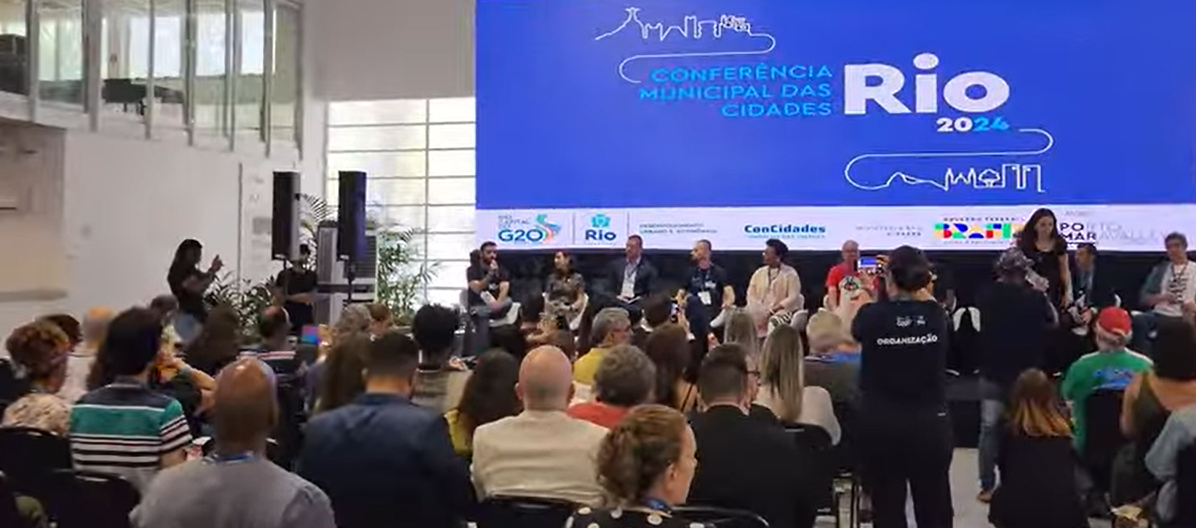
Clique aqui para Português
On June 29 and 30, 2024, Porto Maravalley, in Rio de Janeiro’s downtown Port Region, hosted the 5th Municipal Conference on Cities, one of the stages of the 6th National Conference on Cities. The venue is home to startups and the headquarters for the Institute for Pure and Applied Mathematics (IMPA Tech). The event brought together representatives of the municipal, state, and federal executive and legislative branches, as well as grassroots movements and NGOs.
In 2024, Brazil’s federal government, through the Ministry of Cities, launched the 6th National Conference on Cities. After the general regulation was issued and the base text was published for discussion, the next phase began, during which each state must establish its internal rules for the local and regional stages of the Conference.
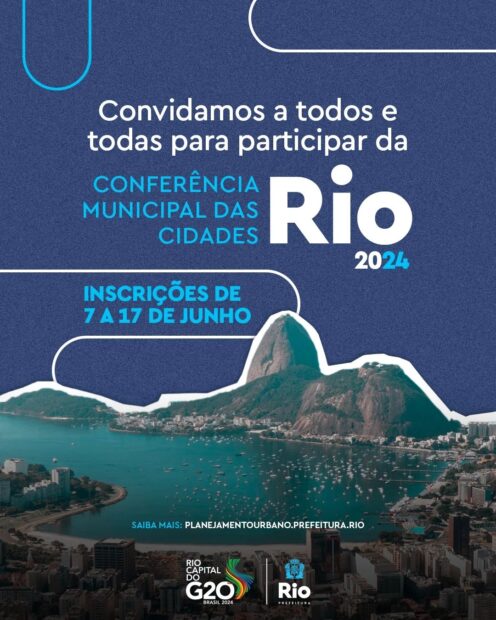
The first is municipal, which is a requirement to promote democratic urban management, guaranteeing true participation by the population. According to the rules, the organizing committee must reflect the proportionality of various sectors: 42.3% for government, 26.7% for grassroots movements, 9.9% for labor unions and entrepreneurs, 7% for academic bodies and councils, and 4.2% for NGOs working in urban development. This proportionality aims to mobilize civil society and public authorities at the municipal level. After the municipal stage, the debates move on to the state level, and finally, to the national stage.
The main objective of this process is to update the National Urban Development Policy (PNDU), aligning it with local realities and challenges. The PNDU aims to reduce socio-spatial inequalities and promote urban reform, as outlined in Brazil’s City Statute.
After the ousting of President Dilma Rousseff in 2016, the dismantling of organizations responsible for spearheading debates and shaping urban policy at the national level created a void in both discussions and guidance regarding issues inherent to Brazilian urban policy. Once conferences resumed during President Luiz Inácio Lula da Silva‘s third term, long-neglected topics from the municipal urban agenda were brought back to the forefront.
A total of 823 spots were made available for delegates and 250 for observers. The internal regulations established criteria for debates, voting, and the election of representatives to the Municipal Council of Urban Policy (COMPUR), as well as 143 delegates to the State Conference.
However, it is important to note that the organization of the 2024 Municipal Conference was criticized for being rushed. The organizing committee had only one month to prepare the event, and its promotion was insufficient. The registration process was complicated, making it difficult for grassroots organizations to participate.
5th Municipal Conference on Cities: Social Mobilization and the Climate Crisis
The opening of the 5th Municipal Conference on Cities was attended by representatives from various sectors, including the municipal, state, and federal executive and legislative branches, as well as grassroots movements and NGOs. Tainá de Paula, a City Council member and former Secretary of Environment and Climate for the City of Rio, pointed out that over 50% of households in the state do not have full access to water and sanitation, and that a review of the Legal Framework for Basic Sanitation is necessary. Meanwhile, Marcelo Braga Edmundo, from the Grassroots Movements Center (CMP) and the Vito Giannotti Occupation, advocated for democratic management and constant popular participation in the formulation of urban policies.
“I would like to acknowledge the presence of the associations, movements, and occupations here today! It is for this group that we must envision a new city! I would also like to express my regret at the mayor’s absence, who must have more important things to do than participate in the city’s democratic processes. I would also like to remind everyone that democratic management and democracy itself, especially in an election year, are not achieved simply by casting a vote. And casting a vote doesn’t mean the elected official can do whatever they want in the city. The city must always be heard! Decisions cannot be made by just one person.” — Marcelo Braga Edmundo
View this post on Instagram
Discussions were realized by working groups, addressing eight thematic axes defined by the Ministry of Cities: housing and land tenure, basic sanitation, urban mobility, social control and democratic city management, management of inter-federative and metropolitan regions, environmental sustainability and climate emergencies, digital transformation and inclusion, public security, and confronting armed control in working-class territories.
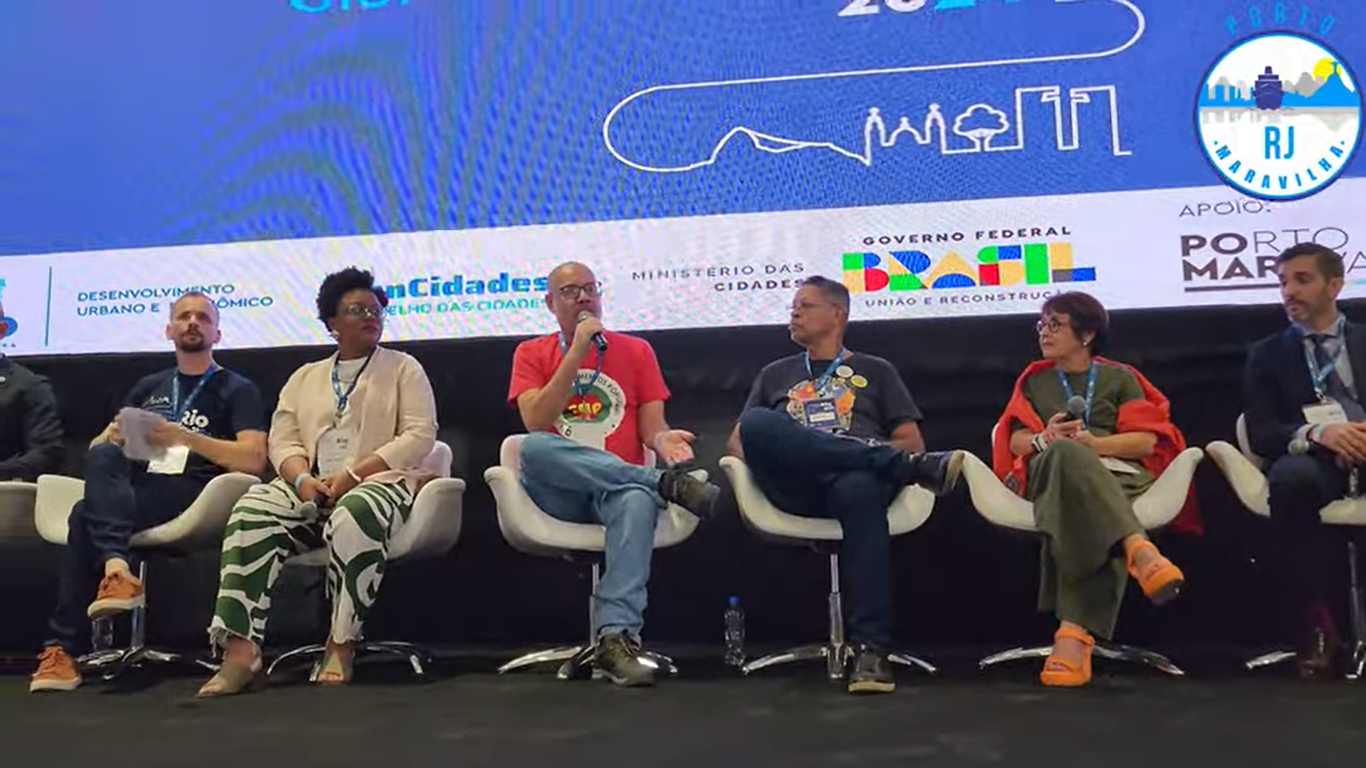
The first day of the conference was dedicated to discussing the first four axes, while the second focused on the remainder. Following discussions and presentations, proposals were submitted to the respective panels. After submission, the panel read out the proposals, followed by debate and voting on the final, adjusted proposals. As per the conference’s bylaws, if necessary, time is allotted for speaking in favor or against the proposals. Next, points are presented for the proposal in question, based on amendments sent in writing to the panel. Finally, each axis selected up to four proposals, which were voted on in the final plenary session and approved by a majority vote.
Proposals Made by the Working Groups at the Conference
As a result of the discussions, the following suggestions were made per axis:
- Social Control and Democratic City Management
At the municipal level, the creation of Rio de Janeiro’s Municipal Council of Cities was proposed, modeled after the structure of the National Council of Cities. Furthermore, participatory budgeting would be implemented from its inception, with public participation occurring before the budget guidelines bill is sent to City Council.
In terms of proposals to be taken to the State Conference, it was suggested that the metropolitan railway and subway systems be integrated, both physically and operationally, along with a consolidation of fares and the reactivation of Leopoldina Station for railway use. The restoration of agricultural areas in the city of Rio as a measure for climate adaptation and mitigation was also proposed.
“The conferences resumed by the federal government… are special moments for participation in the democratic management of cities, where we must all engage, all movements… However, the conversation does not end with the conclusion of the conference; it must continue with all social sectors, discussing the occupation and use of urban spaces in a democratic manner. The democratic management of cities must involve hearing all sectors.” — Jorge Silva, Engineers’ Union
- Housing and Land Tenure
At the municipal level, it was proposed that the municipality’s housing policy include: regulating and implementing the self-management program; creating an oversight body dedicated to Minha Casa Minha Vida public housing complexes; allocating at least 1% of the municipal budget for housing, coordinated by the Municipal Housing Secretariat (SMH); incorporating the Municipal Fund for Social Interest Housing (FMHIS) into the National System for Social Interest Housing (SNHIS), with the FMHIS management council playing an equal, decision-making, and supervisory role; making it a priority that public properties be destined for the provision of Social Interest Housing (HIS); increasing FMHIS resources by securing funds from Reurb E [middle-class and major housing developments] and directing them to Reurb S [primarily favelas]; resuming the development of the Municipal Social Interest Housing Plan as a regulatory framework; creating a social rental program and a technical assistance program for HIS; establishing mandatory climate change adaptation guidelines for HIS projects and favela upgrading; suspending forced evictions; and creating a housing aid program for families affected by socio-climatic events, with adequate and annually adjusted amounts based on the Extended National Consumer Price Index (IPCA).
“The old agenda is outdated, falling apart, and no one is fixing it… For instance, [the] Cantagalo [favela], right next to where I live, has been ready to [have its land rights] regularized for at least ten, maybe 15 years, and nothing happens. I have no idea why. The courthouses have approved everything, it’s all set, but there’s this patrimonialist conspiracy… That’s what no one seems able to break. And I ask you, where is the City Statute? It seems to have vanished! There are several important mechanisms for the recovery and democratization of the city, of property… When the government carries out an upgrading project, we must not forget that it can harness the resources from that intervention to make democracy work in the area where the project was done.” — Aspásia Camargo
On the topic of housing, one of the highlights were the words of Gianni Marchezini, representative of the National Movement for the Fight for Housing (MNLM).
“I just wanted to remind everyone that a property title is a gateway to real estate speculation, right? [With that], the right to housing is not limited to having a property title. The right to housing is much more than that. It’s the market that needs property titles to function, as it depends on speculation. [In the meantime] workers need adequate housing. Workers need a government that isn’t just a manager for the market. Just to be clear, this is what we need to create, you know? It’s a whole other conversation when we talk about the right to housing and titling. Our titling needs to guarantee our right to live in our homes, not the right to turn them into a market commodity.” — Gianni Marchezini
As a recommendation for the State Conference, it was proposed that forced eviction orders be suspended, state public properties be allocated for Social Interest Housing, and that at least 1% of the state’s budget be guaranteed for Social Interest Housing policies.
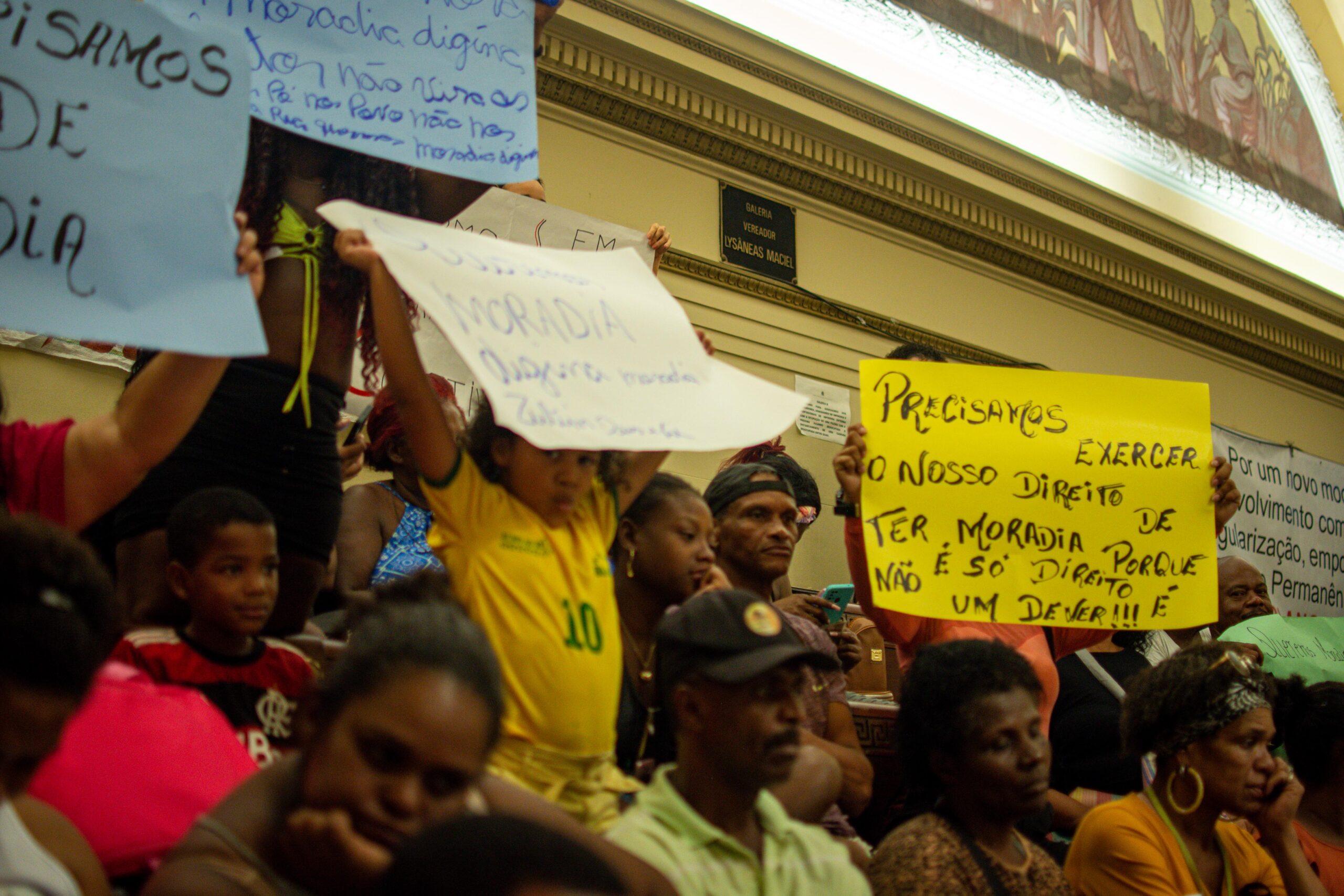
- Urban Mobility
In the field of mobility, the delegates proposed the transfer of sidewalk management responsibilities to the public sector, with the use of public funding for their adaptation and maintenance, ensuring universal accessibility and the development of pedestrian-friendly plans (giving streets back to pedestrians), as well as the implementation of new bike lanes to be created in spaces currently designated for cars. They also proposed the assurance of public transportation availability throughout the day, including nighttime services, with regular and reasonable intervals, along with the provision of covered shelters equipped with GPS information on buses, and a zero fare policy, with a reduction or complete elimination of public fare costs.
As a proposal for the State Conference, the expansion of transport corridors was recommended, with a focus on rail transport, along with the establishment of a partnership between the state and municipality of Rio to implement additional waterway connections.
View this post on Instagram
- Basic and Environmental Sanitation
On the topic of sanitation, the proposals were: the implementation of two energy recovery plants, with manual sorting and associated with recycling cooperatives, one to be located in Caju (on public land) in the Port Zone, and the other in the West Zone; and the ranking of locations for sanitation interventions, using technical criteria such as risk, exposure, susceptibility, and resilience to the effects of climate change.
As a recommendation for the State Conference, it was proposed to amend the decree regulating social tariffs to incorporate new categories of users, such as individuals registered in Cadúnico [the federal government’s Unified Registry, used to identify and enroll socially vulnerable groups in social assistance programs], as well as favela residents and those living in Areas of Special Social Interest (AEIS). It was also recommended that a review take place of social tariffs in housing complexes built by the National Housing Bank (BNH), revisit social tariffs in service concession contracts to include Cadúnico beneficiaries, hold the Energy and Sewerage Regulatory Agency (AGENERSA) more accountable in fulfilling its regulatory role, expedite the review of concession contracts to ensure service for all favelas, allocate concession fees for sanitation services to investments in low-income areas, and improve the professional standards of regulatory agencies overseeing sanitation concessions.
View this post on Instagram
- Environmental Sustainability and Climate Emergencies
Some sustainability proposals included: the creation of a popular school focused on socio-environmental best practices; the implementation of a recycling program with the installation of eco-points by Comlurb, the municipal waste management utility; the adoption of bioremediation as a public policy; the implementation of projects aimed at the recovery and preservation of all natural spaces in the city; restoring the budget and hiring processes for environmental and urban planning agencies; the drafting of laws to standardize electricity and water rates for beneficiaries of Minha Casa Minha Vida public housing; transferring licensing responsibilities to the Municipal Secretariat of Environment and Climate (SMAC); the effective execution of Rio’s urban tree planting plan and related initiatives; the establishment of a Municipal Environmental Sanitation Council with civil society participation; the upgrading of vulnerable areas; land tenure; and municipal budget allocations for climate change adaptation, among others.
“Activists in the urban and housing rights movements are well aware of the key issues we need to stand firm on… Rio de Janeiro needs to make it clear to the entire country why we haven’t advanced in land tenure… and we need to address where the Minha Casa Minha Vida housing complexes are and how they are faring—many of them still without titles, without occupancy permits, and some even without a functioning management association!” — Tainá de Paula
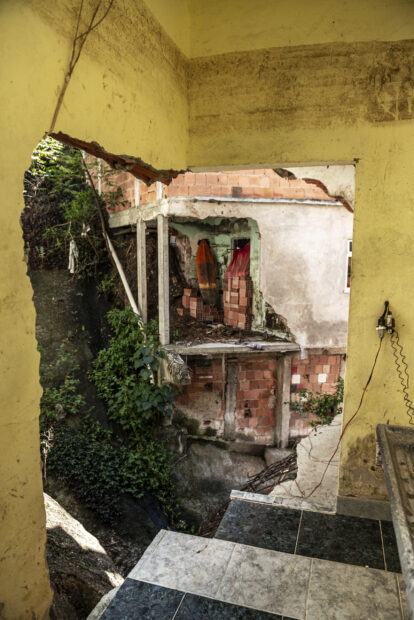
For the State Conference, it was proposed that private companies involved in building Minha Casa Minha Vida projects be mandated to invest in sustainable construction; the creation of a transparency portal to disclose actions related to sustainability investments, compensatory measures, and royalties; the integration of sectoral plans with the Climate Action Plan and making the Climate Action Plan a legal obligation, integrating it with the Master Plan; and proposing policies and tools for vulnerable populations.
- Public Safety and Addressing Armed Control of Working-Class Territories
On this issue, the proposals for both the municipal and the state conference were the same: no arming of the Municipal Guard, the creation of a housing policy that limits the power and expansion of armed groups with clear guidelines, redesign of the Security Policy to ban the use of firearms, ending military actions in favelas, and the mandatory use of body cameras by police officers.
- Digital Transformation and Inclusion
A proposal was made to create an agency responsible for innovation, transformation, and digital inclusion, and that is also responsible for program governance, as well as the establishment of the Municipal Council for Digital Transformation and Inclusion, modeled after the Municipal Urban Council.
- Inter-federative and Regional Management, Cooperation, and Consortia
It was proposed: that the National Urban Development Fund (FNDU) be revived and implemented; to create the National Social Interest Housing System (SNHIS); to increase civil society participation to 20% in the Metropolitan Deliberative Council; and to set up an inter-federative management system integrated with environmental resilience.
Fairer Cities
Over the past ten years, there has been a crisis due to the lack of proposals for national urban policies in Brazil. The revival of hope is reflected by the 6th National Conference on Cities and its subnational phases, which play a crucial role in promoting and strengthening democratic dialogue. In the coming years, we may begin to see the implementation of the demands from these conferences, but not without oversight. Therefore, our role as citizens is to debate, elect our representatives conscientiously, and hold them accountable to ensure proposals are carried out.
